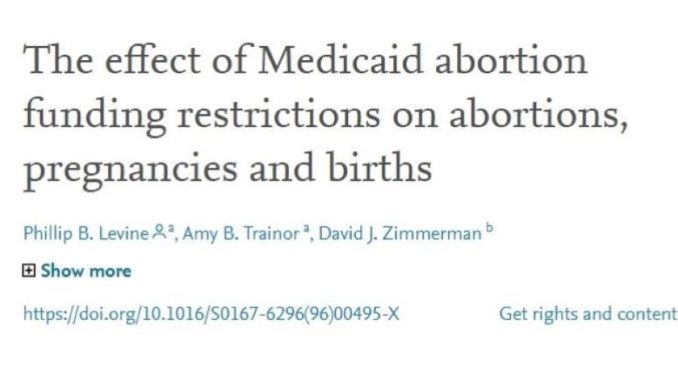
President Trump kicked off his 2020 campaign recently with a massive Florida rally. But while Trump may have been the event’s star, he wasn’t its only speaker. Another was Trump’s eldest son, who had an new nickname for Vice President Joe Biden: “Floppy Joe.”
There’s no shortage of issues that Biden has flip-flopped on. One of the more recent? The Hyde Amendment. First passed on September 30, 1976, it’s a federal budget rider restricting the use of Medicaid funding to pay for abortion. Despite having supported the Hyde Amendment through out his career, Biden has now pledged to end it. Doing so would lead to more abortions, with the Charlotte Lozier Institute estimating that the Hyde Amendment has saved 2.13 million lives. However, there’s something else that its repeal would lead to.
More unplanned births.
That's evident from a 1996 study published in the Journal of Health Economics. It examined the effect of restricting public funding for abortion, and the findings were clear:
An analysis of 12 years of state-level data indicate that restrictions are associated with a reduction in abortions and either no change or a reduction in births, implying fewer pregnancies. Subsequent analysis of the National Longitudinal Survey of Youth (NLSY) is consistent with these findings and show the response is concentrated among the low-income population.
Similarly, a 1999 study found that fewer infants are put up for adoption when abortion laws are tightened. Its authors theorized that "as abortion laws become more restrictive the total number of unwanted births may decrease." Meanwhile, a study of pregnancy and abortion rates in Texas observed that "residents in counties with longer travel distances to the nearest abortion provider have lower abortion rates and lower pregnancy rates."
RELATED NEWS: Can't Raise Your Baby? Plenty Of People Can
What explains those results? Well, when abortion is less available, birth control use and sexual behavior both change, with the result being fewer unplanned pregnancies. A 2008 study on the effects of parental notification laws determined "that the enactment of parental involvement laws significantly reduces risky sexual activity among teenage girls."
Similarly, a 2015 study from the Guttmacher Institute looked at "the relationship between state‐level changes in women's access to abortion and their contraceptive choices." It's conclusion? "Our results indicate that women living in states with more restrictive abortion contexts tend to use highly effective contraceptives." And the results may not be limited to women.
Plenty of men rely on abortion to avoid paying child support, and you can even find online guides explaining how to pressure a woman into getting one:
You need to channel your inner cold, unforgiving, unapologetic asshole nature, as nothing less will suffice. You must not ask, but rather tell her to get an abortion because if she refuses this child will be a bastard. Explain to her in no uncertain terms that you will not be a father to this child. I would avoid personal shots of telling her she is unfit to be a mother because this could backfire on you, but make it clear that if she keeps the baby you will be opting out of fatherhood. Explain that while she may end up collecting the minimum in child support that the state can take from you, in no way will you participate in raising this kid or being a father to it. To instill the seriousness of your message, add that you will refuse any efforts in the future to include you in the child’s life.
If abortion were to become even more available, then such men would have less incentive to use condoms or be selective in their choice of sexual partners. And while they would no doubt succeed in convincing many women to abort, others would choose to carry their children to term.
RELATED NEWS: If Late-Term Abortion Isn't Torture, What Is?
Public funding for abortion would result in more lives being lost. But what the evidence also suggests? That it would lead to more children being born in difficult circumstances. Neither one is something that our tax dollars should be promoting.
What do you think? Leave a comment below.
Be the first to comment